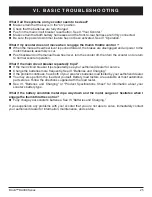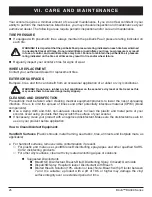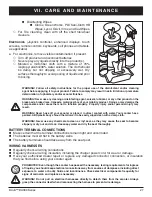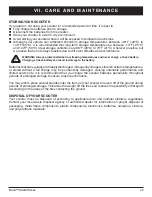
BAJA
™
BA300 Series
29
V I I . C A R E A N D M A I N T E N A N C E
STORING YOUR SCOOTER
If you plan on not using your scooter for an extended period of time, it is best to:
Fully charge its batteries prior to storage.
Disconnect the batteries from the scooter.
Store your scooter in a warm, dry environment.
Avoid storing your scooter where it will be exposed to temperature extremes.
Although your vehicle can withstand short-term storage temperatures between -40°F (-40°C) to
149°F (65°C), it is recommended that long-term storage temperatures be between -13°F (-25°C)
and 122°F (50°C). Ideal storage conditions are 68°F (20°C) to 70°F (21°C) wherever possible, but
we realize that is not always feasible due to diff erent climates and environments.
WARNING! Always protect batteries from freezing temperatures and never charge a frozen battery.
Charging a frozen battery can result in damage to the battery.
Batteries that are regularly and deeply discharged, infrequently charged, stored in extreme temperatures,
or stored without a full charge may be permanently damaged, causing unreliable performance and
limited service life. It is recommended that you charge the scooter batteries periodically throughout
periods of prolonged storage to ensure proper performance.
You may wish to place several boards under the frame of your scooter to raise it off of the ground during
periods of prolonged storage. This takes the weight off the tires and reduces the possibility of flat spots
developing on the areas of the tires contacting the ground.
DISPOSAL OF YOUR SCOOTER
Your scooter must be disposed of according to applicable local and national statutory regulations.
Contact your local waste disposal agency or authorized dealer for information on proper disposal of
packaging, metal frame components, plastic components, electronics, batteries, neoprene, silicone,
and polyurethane materials.



































